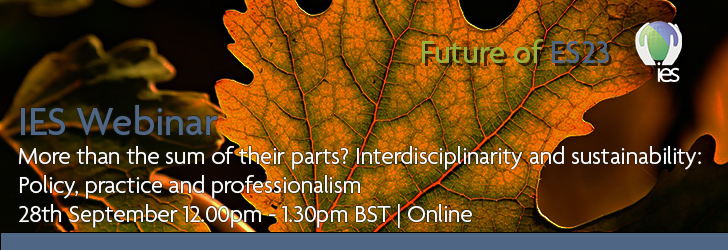Over half a century ago, an editorial in an academic journal suggested that a specialist ended up ‘knowing more and more about less and less’. By contrast, and in the context of a now highly interconnected and uncertain world, the notion of interdisciplinarity raises the need of learning ‘more about more’ than such specialisation allows. A growing shared concern about the multiple and multifaceted economic, social, and ecological issues facing society increasingly and urgently raises questions about the purposes and appropriate responses of the professions. This webinar seeks to catalyse such a debate.
Sustainable development – meeting the needs of present without compromising the ability of future generations to meet their own needs – is a defining challenge of the twenty-first century. It is imperative that all professionals in this country develop and exemplify the skills of sustainable living and professional practice.
Against the background of pressing sustainability issues, there is evidence of increasing interest in more integrative understanding and holistic management of problems in policy making, echoed by more interest in interdisciplinary professional practice. Yet, interdisciplinarity seems to be everywhere and nowhere: it is in vogue in science, society, and economy, but the term is quite misty, foggy, and shadowy. Similarly, Klein (one of the leading theorists in the field) says ‘interdisciplinarity is a concept of wide appeal (but) is also one of wide confusion’. Reviewing the literature, the notion and practice of interdisciplinarity has several interrelated dimensions. These can be summarised as philosophical, definitional, motivational, and operational.
As sustainability issues rise further on the national and international agendas - reflected in media reports almost every day - the links between (say) energy consumption, climate change, loss of biodiversity, and poverty become more evident and the need for multifaceted perspectives and integrative approaches to issues become more accepted – reflected in the common parlance (if not the practice) of ‘joined up thinking’ and ‘joined up policy’
This event will feature expert perspectives on the need for interdisciplinarity in the environmental sciences and sustainability, and how education can support the development of environmental scientists with the skills needed to deliver systems change for the benefit of people and nature.
Relevant background reading:
- Thinking and acting sustainably: Profile of a 21st Century professional
- Sustainable development, systems thinking and professional practice
This free online event is open to everyone.
Our speakers
 Dr Nicola Kemp, Canterbury Christ Church University
Dr Nicola Kemp, Canterbury Christ Church University
Nicola currently works at Canterbury Christ Church University as an academic lead in the University's Academy for Sustainable Futures. A geographer by background, her research interests are focused on the inter-relationship between education and sustainability across ages and educational phases. Much of her research explores children’s relationship with the natural environment. Her current research focuses on outdoor provision for babies and toddlers and the potential of Nature Engaging and Nature Enhancing (NENE) pedagogies. She is co-editor of the forthcoming Routledge book 'Good Education in a Fragile World'.
Professor Stephen Martin: BSc (Hons); PhD; Hon FSE; FRSB; F.I.Env Sci; FRSA. Change Agents Co- Founder and President
 Steve is a passionate advocate for learning for sustainability and has spent over 30 years facilitating and supporting organisations and governments in ways they can contribute towards a more sustainable future. For nearly a decade he was a member of Her Majesty’s Inspectorate of Further and Higher Education (specialising in agricultural and science education in the East and West Midlands), with national responsibility for Environmental Education. He served as a special advisor to the Secretary of State in the Department of the Environment in drafting the education and training sections of HM Government’s first white paper on the Environment - Our Common Inheritance. He was the founding chair of the Higher Education Academy’s Sustainability Advisory Group. For five years he served as an education for sustainability policy advisor to the UK’s National Commission for UNESCO. He was formerly Director of Learning at Forum for the Future, the leading Sustainability Charity in the UK. He is a former Trustee of the Worldwide Fund for Nature and an Honorary Fellow of the Society for the Environment and a Fellow of the Royal Society of Biology. He is Co-Founder and President of the charity Change Agents UK. From 2016 until 2019 he was a member of the UKSSD ‘s Steering Group in the development of a UK wide progress report (Measuring Up) on the implementation of the Sustainable Development Goals (SDGs). From 2021 he began to support Nottingham University with its sustainability strategy and in partnership with Matlock Town Council he is creating a community led renewable energy programme to support Matlock and the Derbyshire Dales District Council’s Net Zero Climate targets. He is a keen cyclist and walks as often as possible in the Derbyshire Dales.
Steve is a passionate advocate for learning for sustainability and has spent over 30 years facilitating and supporting organisations and governments in ways they can contribute towards a more sustainable future. For nearly a decade he was a member of Her Majesty’s Inspectorate of Further and Higher Education (specialising in agricultural and science education in the East and West Midlands), with national responsibility for Environmental Education. He served as a special advisor to the Secretary of State in the Department of the Environment in drafting the education and training sections of HM Government’s first white paper on the Environment - Our Common Inheritance. He was the founding chair of the Higher Education Academy’s Sustainability Advisory Group. For five years he served as an education for sustainability policy advisor to the UK’s National Commission for UNESCO. He was formerly Director of Learning at Forum for the Future, the leading Sustainability Charity in the UK. He is a former Trustee of the Worldwide Fund for Nature and an Honorary Fellow of the Society for the Environment and a Fellow of the Royal Society of Biology. He is Co-Founder and President of the charity Change Agents UK. From 2016 until 2019 he was a member of the UKSSD ‘s Steering Group in the development of a UK wide progress report (Measuring Up) on the implementation of the Sustainable Development Goals (SDGs). From 2021 he began to support Nottingham University with its sustainability strategy and in partnership with Matlock Town Council he is creating a community led renewable energy programme to support Matlock and the Derbyshire Dales District Council’s Net Zero Climate targets. He is a keen cyclist and walks as often as possible in the Derbyshire Dales.
 Professor Simon Spooner, Atkins
Professor Simon Spooner, Atkins
Prof. Simon Spooner is an environmental scientist applying scientific models combined with social, economic, political and regulatory methods to address the challenges that we face and help build better infrastructure systems. Over the last 30 years as a consultant with Atkins and before that at Mott MacDonald he has had a role in solving many of these challenges such as the impact of our cities on river water quality, how to track threats like COVID-19 through our water systems, how to incorporate nature-based solutions into our infrastructure, and how to plan better responses to climate change. For this he has developed the combustion transition framework, an innovative approach to integrating GHG emissions reductions and land-use based regeneration of natural processes with a system of metrics and economic tools.
He has worked about half his time overseas, mostly in China, on major World Bank, EU and UK government projects in urban planning, energy systems and environmental policy. He is an honorary professor at Nottingham university in China and UK campuses and has written and edited a number of books on water and environmental management, regulation and adaption of European approaches to China for OECD, FWR, EU and Chinese publishers.


